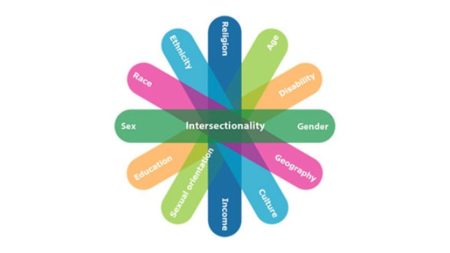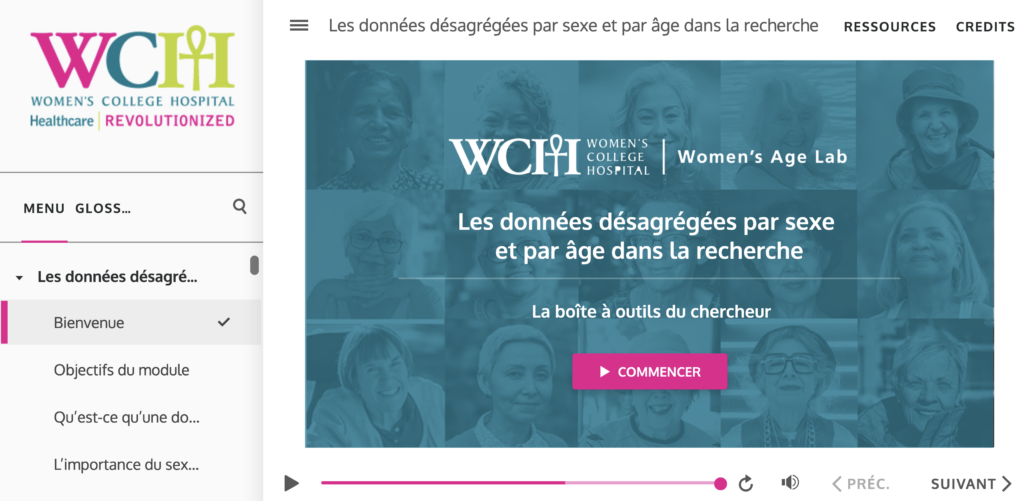Women’s College Research Institute (WCRI) is a leader in the promotion of SGBA+ (sex- and gender-based analysis plus) across all health research. This idea is embedded into our DNA at Women’s College Hospital (WCH) and aligns with our wider organizational mandate – the pursuit of equity for all. Inclusive health research that incorporates diversity by taking factors beyond sex and gender into account has the capacity to benefit everyone.
Visit the Resources section below for The Health Researcher’s Toolkit.
Récemment ajouté :Les données désagrégées par sex et par âge dans la recherche
SBGA+: A Strategy to Advance Equity, Diversity and Inclusion in Health Research
SGBA+ is the process of integrating sex, gender and key factors of identity throughout the research process, from conceptualizing (e.g. – research question development) to completion (e.g. – knowledge translation).
We know that sex (biological differences) and gender (socially constructed roles, behaviours, expressions and identities) are two important socio-demographic factors that affect health experiences and outcomes. The inclusion of “plus” in SGBA+ points to the many key social determinants that may affect health, including ethnicity, income, age, race and education. This idea is at the heart of the work our WCRI scientists are doing; from research design to measurement, analysis and implementation. We know health research that includes an SGBA+ lens is more scientifically rigorous and responsive to the diverse health needs of people in Ontario, across Canada and around the world.
Taking SGBA+ into account has the potential to make research more ethically sound, inclusive and effective. The inclusion of an SGBA+ lens into the design, evaluation, implementation and dissemination of research creates evidence-based, effective and appropriate healthcare policies for all. Ultimately, it enhances patient care, program development and treatment. Further, integrating an SGBA+ lens in health research will make proposals stronger and findings more relevant, leading to greater impact which will help advance equitable outcomes for all.

Equity, Diversity and Inclusion
For more than a century, Women’s College Hospital (WCH) has been committed to the principles of equity, diversity and inclusion (EDI). Just look at our history – WCH was the first place in Toronto where women could study medicine and the first hospital where they could practice this discipline. WCRI is building on this commitment to EDI to generate stronger research outputs, create more inclusive research environments and strengthen the impacts of research. But how exactly do we define equity, diversity and inclusion?
Equity means fairness. Equity in health means that peoples’ needs guide the distribution of opportunities for well-being.
Diversity means having a range of individuals with various racial, ethnic, socioeconomic and cultural backgrounds with various lifestyles, experience and interests.
Inclusion means that all individuals feel respected, recognized, accepted and valued.
Resources
Our Partners
By working with Diabetes Action Canada (DAC), Women’s College Research Institute (WCRI) leads the integration of sex and gender considerations throughout the network’s research processes and products. By partnering with each of DAC’s nine national research teams, we are helping to increase capacity and advance the future of diabetes research in Canada. For more information, visit: diabetesaction.ca
With the support from the Ontario SPOR Support Unit (OSSU), WCRI has had the opportunity to expand activities promoting the inclusion of SGBA+ in health research. OSSU supports WCRI’s Sex and Gender Research Support Service (SGRS), which responds to queries from the community of OSSU researchers and others seeking to improve their inclusion of SGBA+. This contributes to our goal of establishing Ontario as the national leader on the integration of SGBA+ in all health research. For more information, visit: CIHR.
The Health Researcher’s Toolkit: Why Sex & Gender Matter
To produce robust and useful findings, it is critical to integrate considerations of SGBA+ in health research studies. Yet, it is not always easy to figure out how best to do this when study methods can vary so widely.
The modules included in this toolkit introduce key concepts, definitions, and short video lectures from research experts on integrating SGBA+ into a variety of research methodologies – from secondary data analysis to concept mapping. Case studies, knowledge reviews, and short quizzes all help reinforce the described steps and strategies.
An historical review of the ongoing struggle for equitable health care access in Canada.
Definitions and their correct usage are integral to improving health services, clinical care, and research.
Case Study: Sex and Gender Disparities in Access to Care and Outcomes Related to Joint Replacement
Click here to access the Why do Sex and Gender Matter? module.
The importance of acknowledging sex and gender diversity and designing appropriate data collection tools.
Click here to access the Inclusive Sex and Gender Data Collection in Survey Research module.
Appraising sex-specific group analyses in clinical trial data and the importance of reporting outcomes by sex.
Click here to access the Sex-Specific Analyses and Reporting in Clinical Trials module.
Using qualitative and quantitative methods to capture the experiences of LGBTQ2S identified persons in accessing home care.
Case Study: Surveying Challenges with LGBTQ2S Homeless Youth
A novel method used to explore gender differences in understanding and perceptions of abusive relationships.
Click here to access the Concept Mapping: Gendered Perceptions of Intimate Partner Violence module.
Examining strategies to strengthen collaborative research with vulnerable, marginalized or socially excluded communities.
Exploring what intersectionality means and how it can enhance understandings of the ways in which sex and gender intersect with key aspects of identity to shape a person’s lived experience.
Click here to access the Intersectionality as a Research Lens module.
Dans ce module, nous explorerons ce que signifie l’intersectionnalité et comment ça peut améliorer la compréhension des façons dont le sexe et le genre interagissent avec d’autres aspects d’identité pour façonner l’expérience vécue d’une personne.
liquez ici pour accéder au module L’intersectionnalité comme objectif de recherche.
Sex and age disaggregated data are crucial to advancing health and socioeconomic equities and should be the standard of practice in health research. This self-paced, interactive module shows why disaggregating data by sex and age is important, potential problems that can occur when they are not considered, and how some conditions and treatments differ by sex and age. Developed by WCH scientist Robin Mason for both novice and more experienced researchers, the module is both engaging and informative


